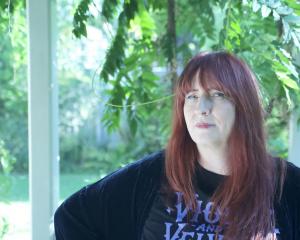
His latest, The Churchill Factor, marking the 50th anniversary of Churchill's death, was the brainchild of Johnson's editor at Hodder & Stoughton and the Churchill estate.
While acknowledging he is not a professional historian and conscious of the many hundreds of books on Churchill, Johnson felt it was time for a new assessment. Largely because, as Johnson points out in his foreword, some 50 years after he died, Churchill is in danger of being forgotten, or at least imperfectly remembered.
Most young people in Britain, Johnson says, think Churchill is the dog in a British insurance advertisement. Which strikes him as a shame, as he believes Churchill is so obviously a character who should appeal to today's young people.
Churchill was eccentric, over the top, camp, with his own special trademark clothes. And he was a thorough genius.
Johnson cheerfully and irreverently describes Churchill in one instance as being dressed in strange Victorian/Edwardian garb, ''like some burly and hungover butler from the set of Downton Abbey''.
My generation and that of my parents largely remembers Churchill for his memorable speeches. It is has been said these speeches were on a par with Hitler's. However, whereas Hitler's speeches made you think HE could do anything, Churchill's speeches made you think YOU could do anything.
Hitler showed the evil that could be done by the art of rhetoric. Churchill showed how rhetoric could help to save humanity. What is even more remarkable is that Churchill had no speech writer; he did it all himself.
By May of 1940, Churchill was 65 and prime minister, but he was not everyone's choice. The outgoing prime minister, Neville Chamberlain, had wanted the Foreign Secretary, Lord Halifax, to take on the post, as did King George VI, many in the Labour Party, the House of Lords and, of course, the Tories. It was as well Lord Halifax turned down the offer, as he and the rest of the War Cabinet were pro-appeasement and wanted to negotiate with the Germans.
All, that is, except Churchill, who in an extraordinary meeting rallied the full Cabinet to his cause.
Halifax was not alone in his appeasement stance. The British ruling class was riddled with appeasers and pro-Nazis. Your average toff, Johnson says, was much more fearful of Bolshevism, and communism's alarming ideology of redistribution, than of Hitler. They saw him as a bulwark against the Reds and they had high-level political backing.
Which is not surprising, for, as the book points out, Hitler had said plenty to encourage peaceful co-existence between the British Empire and the Nazi Reich. Britain and her Empire to survive as a junior partner, full of historical interest but fundamentally effete: the Greeks to the Nazi Rome, Johnson says.
Effete Churchill certainly was not; no prime minister since Wellington had seen so much active service or had the unique distinction of being shot at on four continents. There was nothing he was going to ask the British armed forces to do that he would not have done himself.
By the time Churchill came into Downing Street in 1940, he had written and read so much history as to have a unique understanding of events, to see them in context, and to see what England must do. The reason he was so formidable, Johnson writes, is that he had the facts; he knew the reality about Germany and he intuitively understood the threat the Nazis posed to the world. In a prescient speech in 1932, Churchill predicted a ''war mentality'' springing up throughout Europe.
Johnson's talent as a journalist is very evident (he worked for The Daily Telegraph) and the book is a populist, readable, warts-and-all version of Churchill's military and political career. .
- Ted Fox is an online marketing and social media consultant.












